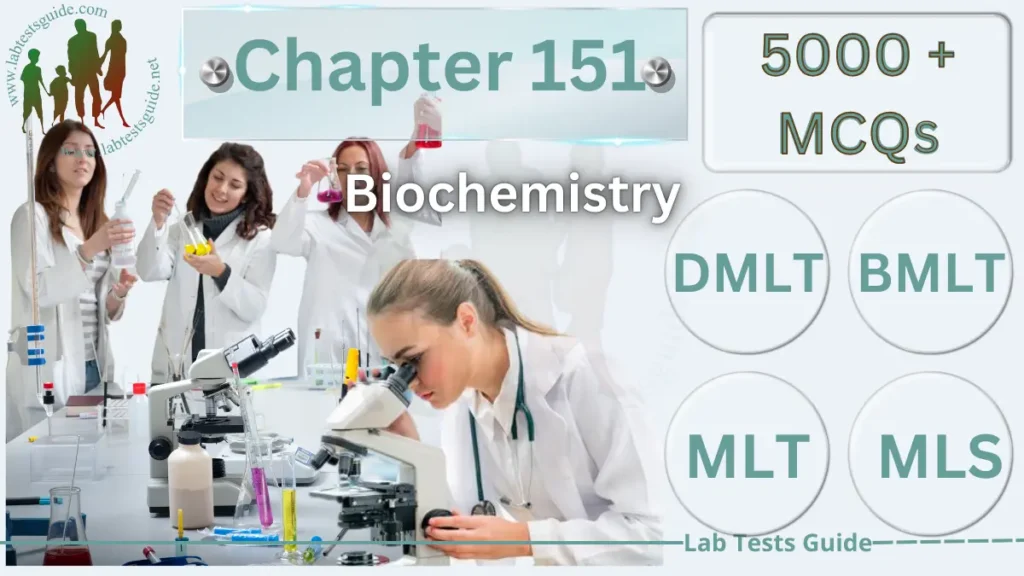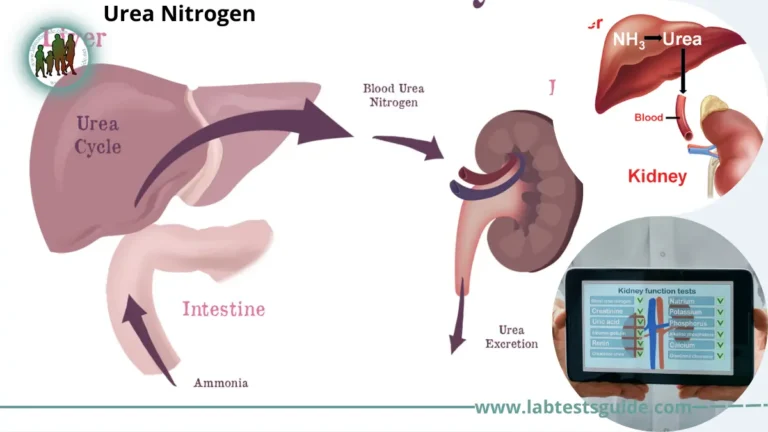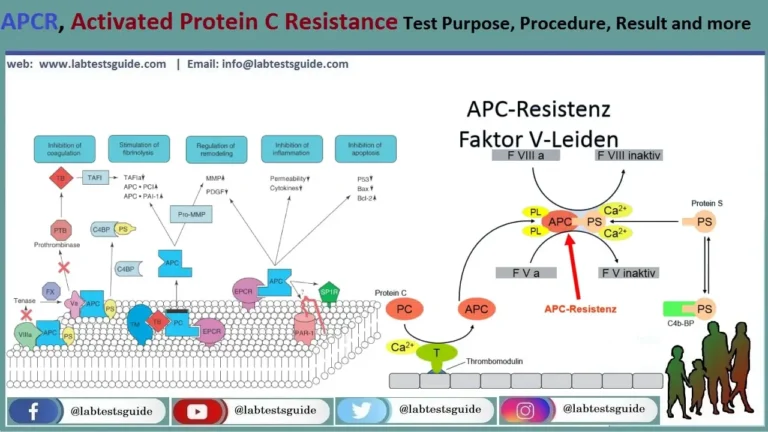7501 to 7550 MCQs for Lab Technician and Technologist Exam Preparation
5000 Plus MCQs for Lab Technician and Technologists are designed to test the knowledge and proficiency of laboratory professionals who work in the field of clinical laboratory science. These questions cover a wide range of topics related to laboratory science, including anatomy, physiology, microbiology, chemistry, and hematology.

If You like then share this to your friends and other social media.
If You have any question and suggestions then please Contact us Here
Questions 7501 to 7550
- Which of the following is used for inducing labour?
- Prostaglandins ✔
- Prostacyclins
- Vasopressin
- Thromboxanes
- Which of the following does not have disulphide bond?
- Oxytocin
- Vasopressin
- Insulin
- Glucagon ✔
- Which is incorrect ? Epinephrin promotes the glycogenolysis in
- Muscle
- Liver
- Heart✔
- None of these
- Which of one of the following is released by hypothalamus?
- Somatostatin ✔
- Somatotropic hormone
- Somato medin C
- Luteinising hormone
- Which of the following hormone is not under the control of ACTH?
- Aldosterone ✔
- Cortisol
- Corticosterone
- Deoxycorticosterone
- Which of the following organ prefers fructose to glucose
- Liver
- Testes ✔
- Pancreas
- Heart
- Total synthesis of creatine can be done by
- Liver ✔
- Kidneys
- Pancreas
- Heart
- Thyrotropin releasing hormone is a
- Dipeptide
- Tripeptide ✔
- Octapeptide
- Decapeptide
- Hypthalamo _ gonadal oxis, fill up the blank with the suitable word.
- Adrenal
- Thyroid
- Hypophyseal ✔
- Pancreatic
- The sequence of amino acids in human growth hormone and the synthesis were done by
- Sanger ✔
- Krebs
- Chah Holi
- Molisch
- Proopiomelanocortin is the precussor of
- ACTH
- β-tropin
- Endorphins
- All of these ✔
- Adrenalin is synthesized from
- Adenine
- Adenosine
- Tyrosine ✔
- Tryptophan
- Corticotropin releasing hormone controls the direct release of
- Pro-opiomelanocortin ✔
- α MSH
- β MSH
- Endorphins
- The immediate parent of α, β and γ endorphins is
- Pro-opiomelanocortin
- β-lipotropin ✔
- ATCH
- Lipoprotein
- Prolactin release inhibiting hormone is believed to be
- Serotonin
- Norepinephrine
- Dopanine ✔
- Acetyl choline
- Whcih one of the following is not a symptom of cushing’s disease?
- Hyperglycemia
- Hypernatremia
- Hirsutism
- Hyperkalemia ✔
- Insulin increases the permeability of glucose across the plasma membrane of muscle cells by
- Acting on adenylate cycle
- By loosening the integrity of the membrane
- Through Ca2+ ions
- By membrane cruting the hexose carries of intracellular organelles and making them fuse with the plasma membrane ✔
- Somatostatin is produced by
- Hypothalamus
- Pancreas
- Hypothalamus and pancreas ✔
- Hypothalamus and Adrenals
- Insulin like growth hormones are produced by
- Hypophysis
- Liver ✔
- Pancreas
- Thyroid
- In pheochromocytoma, urine will have
- FILGU
- VMA ✔
- 5 HIAA
- Lysine and Arginine
- Aldosteronism will present the chemical pathology of
- Addison’s
- Cushing’s ✔
- Grave’s
- Hartnup’s
- One of the following does not bind T3 and T4:
- Albumin
- TBG
- TBPA
- Haptoglobin ✔
- Epinephrine causes in muscle:
- Gluconeogenesis
- Glycogenesis
- Glycolysis
- Glycogenolysis 11
- Reverse T3 is
- A synthetic compound given counter the effects of T3
- Formed from T4 but has no hormone function ✔
- Formed by isomerisation of T3
- Formed from T4 and has hormone function
- This pancreatic hormone promotes hypogenesis:
- Insulin✔
- Glucagon
- Stomato station
- Pancreozymine
- It is unique that the following single antidiabetogenic hormone effectively counter acts the several diabetogenic hormones:
- Glucagon
- Glucocorticoids
- Insulin ✔
- Growth hormone
- Which of the following statements is correct?
- Thyroxine inhibits utilization of glucose
- Insulin increases utilization of glucose ✔
- Glucagon promotes muscle glycogenolysis
- Insulin inhibits lipogenesis from carbohydrates
- Steroid hormones are synthesized from
- Adenine
- Protein
- Vitamin
- Cholesterol ✔
- Hormones act only on specific organs or tissues. These are called
- Active sites
- Reaction centre
- Target organ/Tissue ✔
- Physiological site
- . __ hormone is a single chain polypeptide having 32 amino acids with molecular weight of 3,600.
- Testosteron
- Thyroxine
- Calcitonine ✔
- Vasopressin
- Which of the following is noted in cushing’s syndrome, a tumor associated disease of the adrenal cortex?
- Decreased production of epinephrine
- Excessive production of epinephrine
- Excessive production of vasopressin
- Excessive production of cortisol ✔
- A cup of strong coffee would be expected to
- Interfere with synthesis of prostaglandins
- Decrease the effects of Glucagon
- Enhance the effects of epinephrine✔
- Provide the vitamin nicotinic acid
- Increased reabsorption of water from the kidney is the major consequence of which of the following hormones?
- Cortisol
- Insulin
- Vasopressin ✔
- Aldosterone
- Lack of Glucocorticoids and mineral corticoids might be consequence of which of the following defects in the adrenal cortex?
- Androstenadione deficiency
- Estrone deficiency
- 17 α-OH progesterone deficiency
- C- α-Hydroxylase deficiency ✔
- ADP ribosylation is the mode of action of
- Cholera toxin ✔
- Acetyl choline
- Muscerinic receptors
- Cyclic AMP
- Which one of the following hormones is derived most completely from tyrosine?
- Glucagon
- Thyroxine ✔
- Insulin
- Prostaglandins
- Insulin regulates fatty acid synthesis by
- Dephosphorylating of acetyl CoA carboxylase ✔
- Activating phosphorylase
- Inhibiting malonyl CoA formation
- Controlling carnitine-Acyl CoA transferase activity
- Hormonal stimulation of the formation of the second messenger inositol 1,4,5 triphosphate (IP3) quickly leads to the release of which other intracellular messenger?
- cAMP
- Prostaglandin
- Calcinon ✔
- Leukotriene
- Hormone receptors that stimulate cAMP production
- are part of a complex of two proteins that transform the external signal into internal cAMP production ✔
- are proteins distinct and separate from those that catalyze the production of cAMP
- cause release of the catalytic subunit upon binding of the hormone
- are not very specific and bind a number of different hormones
- All the following hormones use cAMP as a second messenger except
- Estrogen ✔
- FSH
- Luteinizing
- Glucagon
- All the following hormones promote hyperglycemia except
- Epinephrine
- Norepinephrine
- Insulin✔
- Glucagon
- Glucagon activates the enzyme adenylcyclase which causes the increase of blood sugar level. Hence this hormone is called
- Hypoglycemic factor
- Hyper glycemic factor ✔
- Antidiauritic factor
- Thyrotropin-releasing factor
- TSH hormone biochemically is a
- Protein
- Fat
- Glycoprotein ✔
- Carbohydrate
- The secondary sexual characters in females is effected by
- Estrogens ✔
- Gluco corticoids
- MIS
- None of these
- A hypochromic microcytic anaemia which increases Fe, store in the bone marrow may be
- Folic acid responsive
- Vitamin B12 responsive
- Pyridoxine responsive ✔
- Vitamin C responsive
- Gastric Secretion is regulated by the hormone:
- Glucagon
- Gastrin ✔
- Epinephrin
- ACTH
- An essential agent for converting glucose to glycogen in liver is
- Latic acid
- GTP
- UTP ✔
- Pyruvic acid
- Which of the following hormones is not involved in carbohydrate metabolism?
- ACTH
- Glucagon
- Vasopressin ✔
- Growth hormone
- In the process of transcription, the flow of genetic information is from
- DNA to DNA
- DNA to protein
- RNA to protein
- DNA to RNA✔
- Anticodon region is an important part of the structure of
- r-RNA
- t-RNA ✔
- m-RNA
- z-DNA
The questions are typically designed to assess the technical skills and knowledge required for the laboratory profession, including the ability to analyze laboratory test results, perform laboratory procedures, and maintain laboratory equipment.
To prepare for these MCQs, candidates should have a thorough understanding of the key concepts and principles of laboratory science. They should also be familiar with common laboratory equipment and procedures, as well as laboratory safety protocols.
Candidates may also benefit from studying specific laboratory science textbooks or taking online courses that cover the material tested in the MCQs. Additionally, practicing sample MCQs and reviewing the answers can help candidates identify areas where they may need to improve their knowledge or skills.
Overall, the MCQs for lab technologists are designed to be challenging and comprehensive, requiring candidates to demonstrate a high level of proficiency in the field of laboratory science.
Possible References Used





